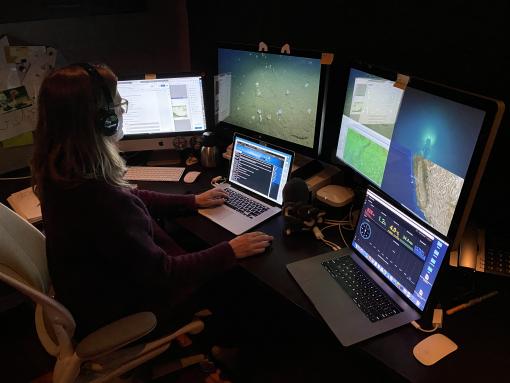Scientists Ashore Program

Researchers and scientists are invited to play an active role in our mission as we explore the Western Pacific Ocean in the 2025 expedition season by participating as a Scientist Ashore. Scientists Ashore are shore-based researchers interested in contributing remotely to the planning, execution, and data analysis of deep-sea explorations aboard E/V Nautilus.
This program connects shore-based scientists with the onboard team via low-latency video streams, real-time data feeds, and two-way communication tools. Anyone can view live streams or other web resources via the Nautilus Live website, but people who register as scientists ashore are able to take their participation to the next level, opening two-way communications with personnel at sea to guide expedition planning and implementation. This platform allows researchers, regardless of location, to engage directly with operations at sea, expanding the potential for discovery.
What would I do as a Scientist Ashore?
As a registered Scientist Ashore, researchers can:
- Provide input during the expedition planning process, including suggesting mapping targets and making sampling requests.
Gain access to the Science Portal, where you can view live, high-resolution video streams and data feeds from the Nautilus’ ROVs and mapping efforts. - Participate in real-time chat room communications with shipboard scientists during expeditions, contributing your insights and helping identify discoveries.
- Contribute your expertise on various ocean science topics, helping to analyze and interpret observations.
Who Should Register
Researchers from all sectors with relevant expertise to the objectives of a mission are encouraged to register as a Scientist Ashore. This includes early career scientists, marine resource managers, and students (whether undergraduate, community college, or graduate students) who are interested in contributing to expedition planning and implementation. The general public, including educators and students of all ages, are encouraged to watch our live stream and send in questions to our team on watch instead. When registering as a Scientist Ashore, you will need to identify your area of expertise and sign up for each expedition you are interested in individually. The Science Portal is not open for Scientist Ashore participation in chartered expeditions.
How to Participate
We will host a 2025 Season Kickoff Webinar on March 18 at 5 p.m. ET. During this webinar, we will provide an overview of the science objectives of 2025 expeditions and outline the planning process for each mission. We encourage researchers from all disciplines and career levels to attend this introductory webinar and learn how to participate in the planning and implementation of E/V Nautilus expeditions as Scientists Ashore.
You can also now register for the 2025 E/V Nautilus Scientist Ashore Program here.
Questions on registering? Please email science@oet.org.
Annual Call for Science Input
In 2025, E/V Nautilus will conduct several multidisciplinary expeditions to explore the deep sea throughout the Western Pacific. With funding from NOAA Ocean Exploration via the Ocean Exploration Cooperative Institute, expeditions will target priority areas in Guam, the Mariana Islands, the Solomon Islands, the Marshall Islands, and Wake Island. We invite members of the science and resource management community, particularly from the geographies where expeditions will take place, to submit science priorities for these expeditions, including specific requests for seafloor mapping, remotely operated vehicle dives, physical samples, and technology integrations. Information received will be used to develop expedition plans and opportunities for collaboration, which will be discussed during planning webinars preceding expeditions. Learn more and submit your priorities here.
Requesting Data and Samples
Expedition data and samples are available post-cruise and scientists are encouraged to utilize data for scientific papers and presentations, student projects, and as a foundation for research grants, etc.
Data: All data including ROV and seafloor mapping digital data and video from the ROVs is available upon request. Previous E/V Nautilus data can be found at the Rolling Deck to Repository (R2R), but for early access to new datasets or pre-2017 data, please use the OET Video & Data Request form. Please allow 1-4 weeks for digital data delivery and up to 12 weeks for video delivery.
Geological Specimens: All geological samples will be archived at the University of Rhode Island’s Marine Geological Sample Lab at the conclusion of the cruise. Subsamples will be available to the scientific community by request.
Biological Specimens: Subsamples will be available to the scientific community by request from Harvard University’s Museum of Comparative Zoology (MCZ).
To review past expedition locations and information, browse the Nautilus Live Expedition web page and NOAA Digital Ocean Atlas.
Any questions about the program or data/sample accessibility can be sent to: datamanager@oet.org.
Chartering Our Technology
Exploration Vessel Nautilus and OET’s Mobile ROV System are available for charter to scientists, government agencies, corporations, or NGOs for oceanographic research and education projects that align with Ocean Exploration Trust’s mission. Nautilus will be operating in the eastern and central Pacific Ocean between the west coast of North America, Guam, and American Samoa. In addition, we have the capability of putting our 4,000-6,000 m rated ROV systems on a chartered vessel to conduct exploration anywhere in the world.
